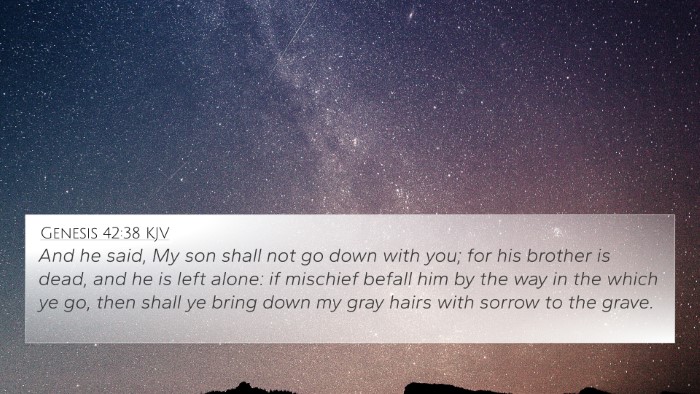Understanding Genesis 44:28
Verse Reference: Genesis 44:28
In this verse, we see a poignant moment of familial distress as Jacob recounts the loss of his son Joseph and expresses his deep grief over his son's supposed death. The context of this mourning reveals profound themes of loss, vulnerability, and the complexities of family dynamics. Let us delve into the insights provided by public domain commentaries to gain a deeper understanding of this verse.
Summary of Genesis 44:28 Meaning
This verse describes Jacob's lament as he reflects on how he believes he has lost his son Joseph, recounting the anguish that arises from familial separation. Jacob’s words highlight the pain associated with loss and the emotional burden that the search for truth brings to family relationships.
- Matthew Henry's Commentary:
Henry emphasizes that Jacob’s overwhelming sorrow represents a natural response to loss. He points out that Jacob is faced with the emotional turmoil of believing that he is again losing a son, which brings forth the depth of a father's love and the weight of despair in the face of tragedy.
- Albert Barnes' Notes:
Barnes notes that the mention of Jacob's deep sorrow emphasizes the fragility of life and the psychological impact of separation. This commentary underscores the relational dynamics at play, including Jacob's reliance on his sons and the cycle of suffering in the face of family disputes.
- Adam Clarke's Commentary:
Clarke reflects on the broader implications of Jacob’s feelings, suggesting that they symbolize a deep yearning and longing that exists in all familial connections. His sorrow serves not only as a personal lament but also as a reminder to the reader about the real emotional landscapes navigated by families in moments of crisis.
Bible Cross-References
To further enrich our understanding of Genesis 44:28, let us explore several related Bible verses that provide thematic connections:
- Genesis 37:34-35: Jacob mourns for Joseph, reflecting the deep sorrow for perceived loss.
- Genesis 42:36: Jacob expresses despair over the potential loss of both Joseph and Simeon.
- Job 30:25: Job's reflection on sorrow emphasizes the universal nature of human suffering.
- Psalm 34:18: This verse assures that God is near to the brokenhearted, aligning with Jacob's grief.
- Luke 15:24: The parable of the Prodigal Son illustrates a father's deep emotional response to loss and longing.
- Matthew 5:4: "Blessed are those who mourn, for they shall be comforted" resonates with Jacob's state of grieving.
- 2 Corinthians 1:3-4: God as the Comforter emphasizes the hope and support during times of sorrow.
Connections Between Bible Verses
This verse is intricately linked to the theme of loss, familial relationships, and the broader scriptural dialogue surrounding grief and restoration. By employing tools for cross-referencing, we can better analyze the intertwined messages of our scriptures, revealing a richer tapestry of Biblical understanding.
Thematic Bible Verse Connections
- Loss and Mourning: Genesis 37:34-35, Psalm 30:5
- Fatherly Love and Care: Luke 11:11-13, Ephesians 6:4
- Hope in Despair: Isaiah 41:10, Romans 8:28
Practical Application of Cross-Referencing
Understanding Genesis 44:28 through cross-references not only enhances comprehension but also builds bridges between various texts, prompting meaningful connections between themes such as grief, family, and divine care. This deeper exploration encourages the believer to see how the scriptures frequently reflect core human experiences.
How to Use Bible Cross-References
Utilizing a Bible concordance or a cross-reference Bible study guide can significantly aid in identifying the relationships between passages. Devote time to prayerfully consider how scripture interrelates, seeking the Holy Spirit’s guidance for insights. Consider making notes or journaling the revelations discovered during these studies to reinforce learning.
Conclusion
Genesis 44:28 is a powerful verse encapsulating the theme of sorrow and the complexities of familial love. By examining the interpretations from various commentaries alongside cross-referenced scriptures, we can appreciate the multifaceted layers of meaning embedded within the Biblical text. This approach not only strengthens our understanding but also fosters a more profound relationship with God through the exploration of His Word.






